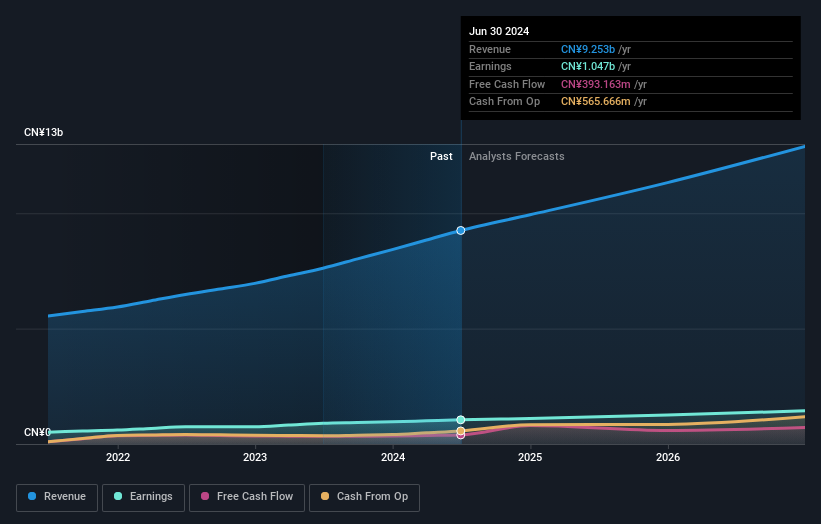Following recent decline, 361 Degrees International Limited's (HKG:1361) top shareholder CEO Wuhao Ding sees holdings value drop by 9.2%
Key Insights
- Insiders appear to have a vested interest in 361 Degrees International's growth, as seen by their sizeable ownership
- 57% of the business is held by the top 4 shareholders
- Ownership research along with analyst forecasts data help provide a good understanding of opportunities in a stock
To get a sense of who is truly in control of 361 Degrees International Limited (HKG:1361), it is important to understand the ownership structure of the business. And the group that holds the biggest piece of the pie are individual insiders with 65% ownership. That is, the group stands to benefit the most if the stock rises (or lose the most if there is a downturn).
And last week, insiders endured the biggest losses as the stock fell by 9.2%.
In the chart below, we zoom in on the different ownership groups of 361 Degrees International.
View our latest analysis for 361 Degrees International

What Does The Institutional Ownership Tell Us About 361 Degrees International?
Many institutions measure their performance against an index that approximates the local market. So they usually pay more attention to companies that are included in major indices.
Less than 5% of 361 Degrees International is held by institutional investors. This suggests that some funds have the company in their sights, but many have not yet bought shares in it. If the business gets stronger from here, we could see a situation where more institutions are keen to buy. We sometimes see a rising share price when a few big institutions want to buy a certain stock at the same time. The history of earnings and revenue, which you can see below, could be helpful in considering if more institutional investors will want the stock. Of course, there are plenty of other factors to consider, too.

Hedge funds don't have many shares in 361 Degrees International. The company's CEO Wuhao Ding is the largest shareholder with 17% of shares outstanding. Huihuang Ding is the second largest shareholder owning 16% of common stock, and Huirong Ding holds about 16% of the company stock. Interestingly, the second and third-largest shareholders also happen to be the Top Key Executive and Member of the Board of Directors, respectively. This once again signifies considerable insider ownership amongst the company's top shareholders.
After doing some more digging, we found that the top 4 shareholders control more than half of the company's shares which essentially means that there is concentrated ownership amongst the top shareholders, most of whom happen to be insiders!
Researching institutional ownership is a good way to gauge and filter a stock's expected performance. The same can be achieved by studying analyst sentiments. Quite a few analysts cover the stock, so you could look into forecast growth quite easily.
Insider Ownership Of 361 Degrees International
While the precise definition of an insider can be subjective, almost everyone considers board members to be insiders. The company management answer to the board and the latter should represent the interests of shareholders. Notably, sometimes top-level managers are on the board themselves.
I generally consider insider ownership to be a good thing. However, on some occasions it makes it more difficult for other shareholders to hold the board accountable for decisions.
It seems that insiders own more than half the 361 Degrees International Limited stock. This gives them a lot of power. Insiders own HK$5.7b worth of shares in the HK$8.7b company. That's extraordinary! Most would be pleased to see the board is investing alongside them. You may wish to discover if they have been buying or selling.
General Public Ownership
The general public, who are usually individual investors, hold a 31% stake in 361 Degrees International. This size of ownership, while considerable, may not be enough to change company policy if the decision is not in sync with other large shareholders.
Next Steps:
It's always worth thinking about the different groups who own shares in a company. But to understand 361 Degrees International better, we need to consider many other factors. For instance, we've identified 1 warning sign for 361 Degrees International that you should be aware of.
If you would prefer discover what analysts are predicting in terms of future growth, do not miss this free report on analyst forecasts.
NB: Figures in this article are calculated using data from the last twelve months, which refer to the 12-month period ending on the last date of the month the financial statement is dated. This may not be consistent with full year annual report figures.
Have feedback on this article? Concerned about the content? Get in touch with us directly. Alternatively, email editorial-team (at) simplywallst.com.
This article by Simply Wall St is general in nature. We provide commentary based on historical data and analyst forecasts only using an unbiased methodology and our articles are not intended to be financial advice. It does not constitute a recommendation to buy or sell any stock, and does not take account of your objectives, or your financial situation. We aim to bring you long-term focused analysis driven by fundamental data. Note that our analysis may not factor in the latest price-sensitive company announcements or qualitative material. Simply Wall St has no position in any stocks mentioned.
 Index Options
Index Options CME Group
CME Group Nasdaq
Nasdaq Cboe
Cboe TradingView
TradingView Wall Street Journal
Wall Street Journal